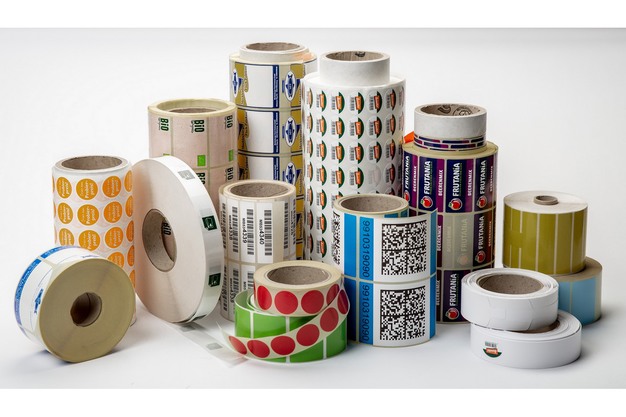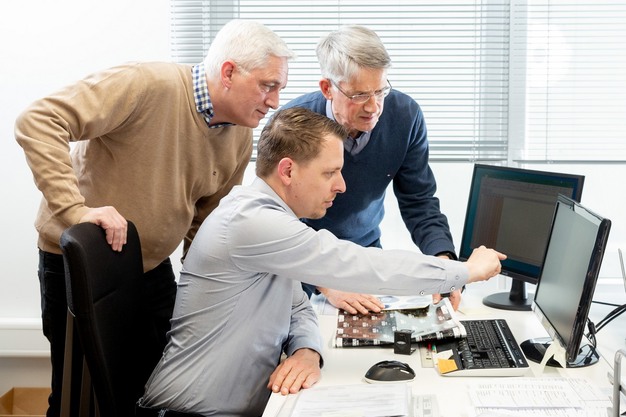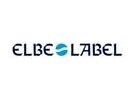Two mutual trends can currently be observed in the labelling of fruit and vegetables: Attempts are being made to reduce packaging material and possibly substitute plastic with paper. "Labels that fulfil these criteria are on the home straight," says Christian Diederichsen, Managing Director of ELBE-LABEL, a company based in the Altes Land region.
When it comes to reducing packaging, banderoles and bar labels are in vogue. "This is due to the fact that they minimise the amount of packaging material used, while no additional waste is generated during production. However, conventional adhesive labels also score points here, as they are still used as direct labelling on the product, for example for cucumbers, avocados or lemons. Wherever possible, people now prefer not to use plastic outer packaging," explains Diederichsen.
According to ELBE-LABEL, there have also been positive developments in the substitution of plastic for paper. Diederichsen: "We offer three different tear-resistant papers for our banderoles and bar labels, with and without thermal paper. The adhesive labels made from grass paper, which are industrially compostable, can protect the environment. We are one of the very few suppliers where both the paper label and the water-based ink can be compostable. Unfortunately, this is a niche product because prices are still not very attractive." Rising raw material and production costs
Rising raw material and production costs
ELBE-LABEL & Co is still being confronted with rising paper and energy prices, Diederichsen continues. "Strategically, we are working in various areas to defy this challenge. This often involves investments, such as the purchase of more energy-efficient machines. In addition, the go-ahead was given for the first construction phase of our solar plant in 2022 and the expansion followed this spring. However, we are also trying to keep our cost structures as stable as possible by optimising workflows and production processes throughout the company and securing long-term supply contracts. Interestingly, as gross national product falls, label consumption is also expected to fall."
 © ELBE-LABEL GmbH & Co. KG
© ELBE-LABEL GmbH & Co. KG
Mr Diederichsen (right) has been with ELBE-LABEL since 2018, initially as an authorised signatory and since 2019 as Managing Director.
Modern solution for the asparagus trailer
As a family-run, medium-sized printing company in the Altes Land region, just outside Hamburg, ELBE-LABEL initially established itself in the 1990s as a labelling supplier for small and large fruit and vegetable producers in the region. Today, the company also supplies industrial and logistics customers in neighbouring countries such as Austria, France, the Netherlands, Denmark and Switzerland. One of the most successful products in recent years is the asparagus tag. "In the past, asparagus was offered in foil or in plastic trays. In the search for more trendy solutions, the contemporary solution of the asparagus tag was developed. For example, 500 g of asparagus are wrapped in a rubber band, into which the asparagus tag is hung manually. This solution is now also used successfully for herbs, spring onions and garlic and is enjoying continuous annual growth rates. Asparagus tags are made of paper and are available with or without a thermal layer or alternatively made of plastic. However, the best option for the environment is the paper version, which can be disposed of in the waste paper bin," explains Diederichsen.
Despite the current challenges, the industry supplier is confident about the future. "Fruit and vegetables are part of a healthy lifestyle, part of the daily menu and will continue to have to be packaged in traditional food retail. Sales also grew by an average of 2.2 per cent between 2018 and 2023. We can participate in these growth rates."
ISO 9001 certification, the use of FSC-certified paper, internal auditing of all print documents, investments in sustainable projects such as solar panels, skilful management of company processes makes the company ideally equipped for the future.
Pictures: ELBE-LABEL GmbH & Co. KG
For more information:
Dr Christian Diederichsen
ELBE-LABEL GmbH & Co. KG
Dollerner Str. 20
21720 Guderhandviertel
Tel.: +49 (0) 4142 / 81 11 20-0
[email protected]
www.elbe-label.de










